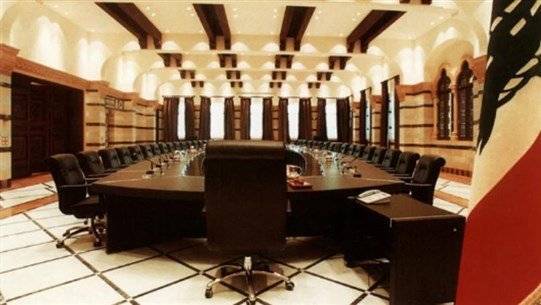In continuation of the governmental crisis stemming from the issue of government formation and the extent of the caretaker government's ability to exercise the powers of the President during a presidential vacancy, it has been recently reported from sources close to President Michel Aoun that "if a government is not formed, he will issue a decree accepting the resignation of the government one day before the end of his term (a decree that is typically issued on the same day as the formation of a new government), but he will issue it without forming a new government. In this case, the current Mikati government will no longer be tasked with caretaker duties and will thus lose its legitimacy, preventing any minister from acting within their ministry, which means a complete paralysis of the executive authority and forcing them to approach Aoun to form a government that he approves, so that he will sign the decree of its formation." However, we believe this analysis does not stand up to constitutional logic for the following reasons:
- Proponents of this analysis rely on the old Article 53, before the constitutional amendment in 1990, when the President had the ability to dismiss the government at will and issue a mandate to the dismissed or resigned government, in accordance with the customs or traditions then prevailing allowing for caretaker duties in the interim between resignation or dismissal of the government and the formation of another government. However, following the constitutional amendment via Article 69, the conditions for a government's resignation and its acknowledgment as resigned are now defined exhaustively and implicitly, without the intervention of another will, especially at the beginning of the Presidential term or the beginning of the Parliament's term. At that point, the issuance of a decree accepting the resignation or acknowledging it as resigned, according to paragraph five of Article 53, becomes a formal act that does not define or negate the constitutional entity of the government, which already lacks parliamentary or political responsibility.
- While the custom has established delays in issuing the decree for the resignation of the government or acknowledging it as resigned, until the issuance of the new government's formation decrees, and the issuance of a mandate from the Presidency to ensure caretaker duties until a new government is formed, this stability was an extension of the tradition prior to the constitutional amendments of 1990. The constitutional legislator enshrined in the amended Article 64 the theory of caretaker responsibilities in a constitutional text, independent of the presidential mandate that declares a constitutional situation resulting from the government's resignation or acknowledgment as resigned, which means that the concept of "caretaker duties" finds its basis and impact in the constitution and not in a presidential mandate. Consequently, the President's refusal to issue a "mandate for caretaker duties" does not relieve the government of this obligation under the second paragraph of Article 64: "The government may not exercise its responsibilities before being granted confidence nor after its resignation or acknowledgment as resigned except in the narrow sense of caretaker duties."
- The confirmation by the constitutional legislator in paragraph five of Article 53 regarding the issuance of a decree accepting the resignation of the government or considering it resigned is akin to an actual or implied declaration of resignation, thus terminating the legal life of a fully constituted government, not a caretaker government explicitly established in Article 64. Therefore, the commitment to "caretaker duties" arises from the moment the conditions of Article 69 of the constitution are met, and not from the issuance of a decree accepting its resignation or acknowledgment as resigned. Otherwise, if that were the case, the constitution would have included this authority among the powers of the President just as it did in Articles 51, 52, 53, 54, 55, 56, 57, 58, 59. This analysis is also supported by the State Council's decision 522 dated 5/5/1999, stating that the government's powers are limited to caretaker duties from the date of announcing the resignation.
- Claiming that the President can terminate "caretaker duties" undermines the requirements of the constitution, as a vacuum in governance is not realized according to the wording of Articles 62 and 64. Caretaker responsibilities are not a privilege granted to the president or other constitutional institutions; rather, they are an obligation dictated by a fundamental constitutional principle, which is the principle of continuity of public services or constitutional institutions. Without it, the life and permanence of the state are threatened. This has been affirmed in the constitutional council's reasoning related to the concept of continuity by stating: The regular performance of constitutional institutions is the foundation of public order in the state, requiring that each constitutional institution promptly carry out its assigned tasks within its granted powers. A vacuum in constitutional institutions contradicts the purpose for which the constitution was established, threatens the system with collapse, and places the country in an uncertain situation (Constitutional Council decision No. 7/2014 dated 28/11/2014 regarding the appeal against the law extending the Parliament's term), and the same is noted in the State Council ruling that the theory of caretaker duties is designed to be applied over a specific transitional period that should not exceed weeks or even days. If it extends for a longer period, it must inevitably reflect on its entire concept to achieve its goal of ensuring the continuity of the state and the public interests and the interests of citizens. If this transitional period extends for several months, it becomes imperative to address this reality in a way that allows the government to ensure the continuity of public services and safeguard the interests of citizens, which cannot wait any longer, especially if the exercise of those rights arises from legal administrative actions that meet all the imposed conditions in laws and regulations, ensuring legitimate individual interests without having a general organizational character or limiting the capacity of the upcoming government to exercise its discretionary powers (State Council decision No. 349/2014-2015 dated 23/2/2015 Tanios Younes et al./State).
Based on this, the President cannot, under the pretext of the appointed president's refusal to form a constitutional authority, abolish an existing institution. The circumstances the country is facing necessitate that all institutions and powers cooperate in ways that serve the citizens, rather than hinder these institutions, which obliges the parliament, emanating from the people, to assume its responsibilities regarding these constitutional matters with much reason and detachment from any particular interest and take a decisive stance either in amending the constitutional articles or in interpreting them to prevent imbalances from occurring from time to time.




